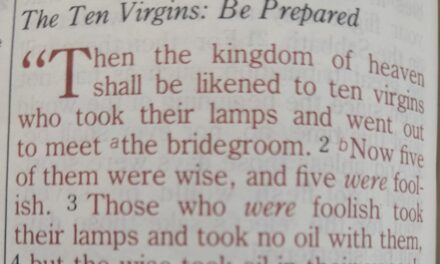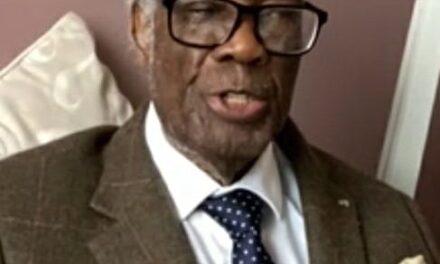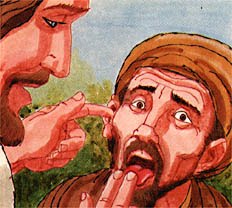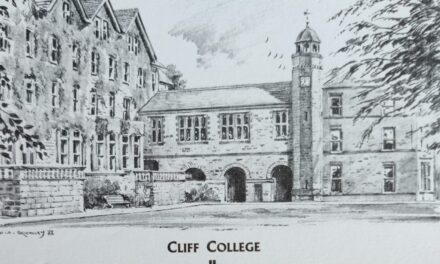The Church’s role as a “sent church” is sacrosanct.[1] Against the managerial and mechanical solutions of Babylon in our post-Christian culture, sending and being sent remains constitutive of Christian mission[2] (Ps 137). Growing 21st century missional church is a reminder for the church to stop repeating its decline and mistake because, ‘the one thing we learn from history is that we don’t learn anything from history.’ Resultantly, churches continue to loose our followers to new communities of belief. Today, the church is continuing in a fatal period with a ‘miserable mistake,’ and rather than confessing and repenting from our sins and mistake, the church is seeking modern therapy and reinterpretation of the biblical and historic doctrines and practices of Christianity.
John Wesley provided the clue to a ‘miserable mistake’ and problem in the third century which resonates with us today. The mistake and problem is about nominal Christianity, many calling themselves Christians just as Emperor Constantine called himself a Christian based on his vain imagination and position. There was no more occasion for repentance and conversion ‘because all the world was become Christian. This is a miserable mistakes…’ even till date with increase of nominal Christian preachers, theologians, and teachers. Growing 21st century missional church as forward to the past is about hearing the extraordinary gifts of the Holy Spirit again through missional occasions to receive them and personal decision are made to follow Christ. Growing 21st century missional church is first to correct ‘a miserable mistake, … all the world was become Christians.’ Christianity is not by nation of birth, colour or race but a personal decision through repentance of sin. Growing 21st century missional church is about reawakening the ‘waxed cold’ of ‘the love of many,’ almost of all Christians. The Christians with no more of the Spirit of Christ than the Heathens need love, prayer and God’s mercy for their redemption so that the Son of Man will still ‘find faith upon earth’ even in the 21st century. Growing 21st century missional church is about reawakening from a dead form of Christianity, theology, preaching, and teaching.[3]
Human history can be a distortion and bondage but Jesus Christ, the Head of the Church is able to redeem the failures, mistake of nominal Christianity, and decline of our past, present and transform our future. Involvement in religious institutions are declining just as religious practices continues to decline in our democracies, schools and economics. Populists’ use of Christianity as a tool and means to engage a society have lost its moral centre, incorporated paganism and capitalism. In the words of John Hull, ‘we looked for a mission-shaped church but what we found was a church-shaped mission,’[4] a godless secularism. We have the nominal symbolisms of God’s presence, but symbolism without reality is of no use. The spread of the corrosive effects of godless secularism points to the breaking down of the restraints demanded by Christian discipleship and practices. Growing 21st century missional church calls us to repent of our past miserable mistake, reclaim the early church original gospel of Christ with the extraordinary gifts of the Holy Spirit in order to power our future, forward to the past.
Jesus, in the Book of Acts communicates a vision in His final words to His disciples about reaching “to the end of the earth” (Acts 1:8). Jesus’ vision lives on. After many centuries that separate us from the early Church of the New Testament, the challenges faced by the Apostle 2021 years ago resonates with us today. To fulfil the Church’s sacred and missional role, there is need for effective ministry to undo decades of nominal Christianity, church decline, reposition the leadership and drive future church growth in the post-pandemic era. Growing 21st century missional church in a post-pandemic world coupled with the communication shift in over 500 years warns us that we cannot be singing the Lord’s song in a strange land. Tom Stuckey, a past President of the British Methodist Conference in one of his books, ‘Singing the Lord’s Song in a Strange Land: The Future of the Church in Britain, A Methodist Perspective raises a divine alarm on what the Holy Spirit is saying to the Church. Speaking about the book, Peter Hancock, Bishop of Bath and Wells explained that, the book ‘although written for Methodists, what the author says about Babylonian captivity of the Church in Britain is pertinent for Anglican as well,’ and I say for the church today in general.[5]
The general nominal Christianity and church decline mainly continue to spread unabated through the church and leadership conscious and unconscious absorption of ‘the values of Babylon into its structures and strategies with the result that it has ceased to be prophetic’ is further compounded by the pandemic. The church ‘has become a public utility offering cheap grace to a consumer public looking for peace and security in troubled times.’[6] Marvin Olasky in his book, Standing for Christ in a Modern Babylon not only ‘examines the ignorance that many secularists have about Christianity’s social impact,’ he also ‘examines the phenomenon of “Christophobia” in the mainstream media.’[7]
The challenge is, how can the Church recover its missional identity, integrity, vocation, and leadership in other to grow 21st century missional church? It is very helpful to seek a reliable example and source on the growth of the early church, a forward to the past. The New Testament provides the best source of the growth and expansion of Christianity in the first century. Acts 2 marks a pivotal point in the New Testament. One hundred and twenty men and women become members of the church when it is born in an upper room in Jerusalem.[8] By the end of Acts 2, the church explodes into a body of more than three thousand members. The reflection is that, the early church was missional with missional leadership spirit-filled and motivated three thousand people to follow Jesus Christ. The early church with leaders like Peter, John, and Paul, was also the church of Ananias and Sapphira, and Judas.
The spreading of the gospel initially focused on the house of Israel extended to scattered Israel and throughout the Roman Empire and beyond. The vision of scattered to gather was the missional endeavour of the early Christians (Acts 8:4). As a forward base for the western gospel operation with Paul travelling and evangelising throughout Asia Minor, Greece and to Rome (Acts 11:19). The growth of the early church assumes a well-established church known throughout the world. Paul, in his desire to visit Rome said, “First, I thank my God through Jesus Christ for you all, that your faith is spoken of throughout the whole world’ (Rom 1:8). The Church of the first century was dominantly urban, especially in Jewish colonies. Christianity was a religio illicita, deemed illegal in the 1st and 2nd century with potential persecutions. The expansion of the early church in the second and third centuries especially to Palestine was a challenge. Jewish Christianity’s influence and power was broken by the mass uprooting of the church of Jerusalem in A.D. 70, assimilated and drifted off into the Gentile churches and its heresy. The first 300 years and explosion of Christianity was not without persecutions for Christians for choosing Jesus over Caesar. The early church was not a tool of the empire nor a parish of the empire but it was counter-cultural, an instrument of breaking down barriers and reaching the unreached.[9]
The growth and spread of the early church was shaped by some missional factors. The early church born in the power of the Spirit on the Day of Pentecost remained faithful and devoted to the strong traditions of the apostles’ teaching and to fellowship, to the breaking of bread and to prayer, and placed value on the Word of God (Acts 1:8, 3:1-20, 4:8-37). The early church practised in smaller groups in homes rather than as one Church of three thousand people. The early church was a praying, evangelistic church with great power, and the miraculous was a hallmark of their witness as ‘the Lord added to their number daily those who were being saved.’ Prayer plays a significant role in the story of the early church. The believers prayed for guidance in making decisions (Acts 1:15-26). They pray for courage to witness for Jesus (Acts 4:23-31). Peter prayed before he raised Dorcas from the dead (Acts 9:36-43). The book of Acts of the Apostles which is the account of the work of the Holy Spirit in and through the early church makes it clear that something happens when God’s people pray. The Word of God and prayer formed the ministry, mission, vision and leadership of the church (Acts: 6:4).
The early church practised matrimony as the same status it had originally possessed between Adam and Eve[10] (Gen. 1:26-27, Lk 16:18, Mk 10:11-12, Rom 7:2-3). According to Douglas, marriage is described a ‘state in which man and woman can live together in social relationship with the approval of their social group.’[11] For the early church, the family unit, or home as the smallest complete unit of society, was the first institution directly by God provided for human benefit, ‘before the entrance of sin into the world’[12] (Gen 2:18, 20-24).
The early church was shaped by missional unity, adapting its message without changing it. John can present Christ as the Son of God, Paul as the Last Adam or the Lord. The early church was filled with spiritual power. Leaders and preacher spoke with power, God’s Word and their message was witnessed by act of power. The power with which the leaders of the early church spoke ‘would have contrasted sharply with the empty chatter of philosophers. The Christianity of the early church had power over the demon world shaped by leadership with transformation and not just for information or propaganda.[13]
The growth and spread of early church was shaped by loving fellowship. The church of Rome’s benevolence example was a model and succour especially ‘for the uprooted, lonely, disoriented masses of the Empire, the kindness, love, and constant deeds of charity within the Christian Fellowship providing for both the needs of its members in life and in death must have drawn many to Christianity.’ The catholicity in the early church was a missional means of grace for the universal conviction about the power of the Christian outreach. Holiness was not a debate but a missional watchword for the early church, hence her moral purity was exemplary. Fornicators embraced chastity, magic artists rededicated themselves ‘to the good and unbegotten God; we who valued above all things the acquisition of wealth and possessions now bring all we have into a common stock and share it out to all according to their need; we who hated and destroyed one another and on account of their different manner of life would not live with men of another tribe, now, since the coming of Christ, live happily with them, and pray for our enemies and endeavour to persuade those who have treated us unjustly to live conformably to the good precepts of Christ, so that they may become partakers with us of the same joyful hope of a reward from God the ruler of all.’[14] There was no missing link between the early church’s holy living and their effective evangelism. The early Christian’s ‘lives made a great impact. Even the heathen opponents of Christianity often admitted as much.’ The early church reflected ‘a genuine Christian emphasis on the essential importance of moral purity to Christianity’ without a growing legalism. The growth and spread of the early church was shaped by eternal hope, ‘a prevalent yearning for immortality.’ In their gospel of ‘historically risen Christ, Christianity had the solid foundation for this hope.’
The post-Constantinian expansion of the early church point to one figure, Constantine, born in 272 and reigned from 306-337.[15] Superficially, Constantine’s religion, Mithraism, a kind of sola monotheism was similar to Christianity, hence, his ‘transition from solar monotheism . . . to Christianity was not difficult.’ Constantine’s conversion occurred in 311 when he saw a vision of the cross against the sun while fighting barbarians and ‘in 312 before his battle against Maxentius he sought the God of the Christians’ help.’ It is on record that, ‘the policy of Constantine was one of toleration. He did not make Christianity the sole religion of the state. He continued to support both paganism and Christianity,’ and sadly, ‘Christian heretics or schismatics faired worse than pagans.’
Constantine as the first Roman emperor to claim conversion to Christianity decreed tolerance for Christianity in the proclamation of the Edict of Milan in 313.[16] The ‘medieval church upheld him as a paragon of virtue, while secular rulers invoked him as a prototype, a point of reference, and the symbol of imperial legitimacy and identity.’ The decriminalisation of Christian worship set Constantine as a precedent for the position of the Christian emperor within the church, a great patron of the Church shaped by the notion of Christendom, orthodoxy, ecumenical council, and the state church of the Roman Empire, declared by edict in 380. The transition of Christianity to the legalised/dominant religion of the Roman Empire marked a sharp and regrettable departure from the missional identity of the early church and Christians.[17] Guder rightly argues that ‘the structures and the theology of our established Western traditional churches is not missional because they are shaped by the legacy of Christendom. In other words, they have been formed by centuries in which Western civilization considered itself formally and officially Christian.’[18]
Growing 21st century missional church is a forward to the past of the early church missional identity, discipline, focus, power and vocation. The missional, sending nature of the early church is formed by the Spirit and reflects God’s missionary character.[19] The character is centred on the application and understanding of Scripture informed by 2000 years of Christian tradition, along with our reason and experience. It is about upholding scriptural authority and the Lordship of Jesus Christ (Acts 2:36). Missional church is counter-cultural just as the early church was against a notion and practices of nominal and consumer-drive church. Growing 21st century missional church illuminates the missionary, sent, and apostolic nature of the early church and not just the ‘new normal’ of nominal Christianity as a recruitment of personnel and religious services. Growing 21st century missional church is about a connected community formed by the Spirit ‘a corrective to an individualist and private version of the gospel.’ Growing 21st century missional church calls for collaborative missional ‘action of discerning God’s call in the church’s unique context with the unique gifts of the community.’ 21st century missional church is about the local congregation becoming the “lens through which people see and interpret what the gospel is about and how it can be embraced.” 21st century missional church is a ‘shift from a church-centred (ecclesiocentric) to a God-centred (theocentric) view of mission.’
Growing 21st century missional church is a paradigm shift the like of which have not been seen, ‘the anthropocentric and ecclesiocentric shifted to a theocentric consideration of missions.’ Just as the early church and Christians were God-directed, theocentric is about mission grounded in God, missio dei, God on a mission for all eternity. [20] Growing 21st century missional church is not market-driven nor anthropocentric or about institutional hierarchy. Kraemer’s view of the Church’s mission needs to be heard again in other to overcome some challenges facing growing 21st century mission church.[21] First, the conception of mission has been abandoned by the church and ecumenical movement in its quest for secularization and its desire to let the world determine the Church’s agenda. The question today is, who and how are we determining the church’s agenda, theological training and leadership? Secondly, church’s mission is essentially a biblical viewpoint, but it is denied by many contemporary churchmen, [22] hence, the nominal and dominant anthropocentric reading of the biblical tradition that has characterized the worldview of Western Christianity. This worldview provided not only the conditions for redefinition and human exploitation of the environment but that of Biblical Christianity, a product of a theocentric worldview.[23]
Growing 21st
century missional church is about biblical realism to overcome the effects of
‘pseudo-absolutes and secularism.’ Signifcant shift in growing 21st
century missional church calls for theocentric missiology, a missio Dei theology with ‘God as the
source and author of mission … with the church’s mission regarded as
derivative.’ Growing 21st century missional church is about mission
with community locally and globally. Sending through the empowerment of the
Holy Spirit is intrinsic to growing 21st century missional church (Acts
2:11, 8:14, 26, 29, Lk 9:2). Growing 21st century missional church
invites us to the ‘boundary-crossing initiative of the early Christian
community.’ The standard for growing 21st century missional church
is in the light of the revelation of Jesus and eschatological. The 21st
century missional church can never feel at home in the world but “finds its origin and
ends in God’s redemptive Will for the world, and therefore enters fully into
the need and peril of the world”[24]
[1] Okegbile, Deji, Missional Leadership for Repositioning Nigerian Methodism (Lagos: Alet Inspirationz, 2019), pp. 54-57
[2] Okegbile, Deji, Stop the Funeral: Reverse Methodists Decline (London: Supertec Designs, 2017), pp. 25-26.
[3] Thomas Jackson, (ed.), The Works of John Wesley Vol. 7 (Grand Rapids: Baker Books, 2007), pp. 26-27; The Works of John Wesley Vol. 10 (Grand Rapids: Baker Books, 2007), p. 16.
[4] Hull, John, Mission-Shaped Church: A Theological Response (London: SCM Press, 2006), p. 36.
[5] Stuckey, Tom, Singing the Lord’s Song in a Strange Land: The Future of the Church in Britain, A Methodist Perspective (Suffolk: Church in the Market Place Publications, 2017), p. bp
[6] Stuckey, Singing the Lord’s Song in a Strange Land:, p. bp
[7] Olasky, Marvin, Standing for Christ in a Modern Babylon (Wheaton, Ill: Crossway Books, 2003), pp. 14, bp
[8] Maxwell, John, C, Elmore Tim (eds.), The Maxwell Leadership Bible, Second Edition (Nashville, Thomas Nelson, 2007), p.1344
[9] Alexander C. Flick, The Rise of the Mediaeval Church (New York: Burt Franklin, 1909), p. 112
[10] Mbang, Sunday, Christian Marriage (Lagos: Methodist Church, 2014), pp. 7-13.
[11] Douglas, J. D. (ed.), The New Bible Dictionary (London, Inter- Varsity Fellowship, 1985), p. 786.
[12] Epp, Theodore, Marriage, Divoorce and Remarriage (Nebraska: A Back to the Bible Publication, 1979), p. 5
[13] Pre-Constantinian Expansion, Samuel Waldron, http://www.vor.org/truth/rbst/hist-theology-003.html
[14] Justin in Pre-Constantinian Expansion, Samuel Waldron, http://www.vor.org/truth/rbst/hist-theology-003.html
[15] Opoku, Francis, Constantine and Christianity: The formation of Church/State Relations in the Roman Empire, in Ilorin Journal of Religious Studies, (IJOURELS), vol 5: no 1, 2015, pp. 17-34.
[16] Alexander C. Flick, The Rise of the Mediaeval Church, 293
[17] https://courses.lumenlearning.com/atd-herkimer-westerncivilization/chapter/constantine/#:~:text=As%20the%20first%20Roman%20emperor,Creed%20was%20professed%20by%20Christians.
[18] Guder, Darrel L. Missional Church: A Vision for the Sending of the Church in North America (Grand Rapids: Eerdmans, 1998). p.5
[19] Schutte, Kevin, Understanding Our Missional Focus, https://network.crcna.org/church-planting/understanding-our-missional-focus
[20] Morine, Matthew, THe Role of God in Evangelsim, https://matthewmorine.weebly.com/blog/the-role-of-god-in-evangelism
[21] Kraemer, Hendrik, The Christian Message in a Non-Christian World (New York: Harper, 1938), pp. 40, 111 – 127, 139-140, 488, 418
[22] https://www.christianitytoday.com/ct/1971/january-1/church-in-search-of-mission.html
[23] Simkins, Ronald A, ‘The Bible and anthropocentrism: putting humans in their place’ in Dialectical Anthropology, volume 38, July 1st 2014, pp. 397-413
[24] Kraemer, The Christian Message in a Non-Christian World, p. 418











Recent Comments